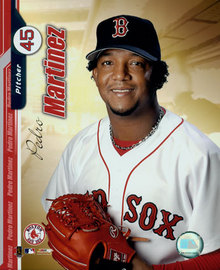I am a big fan of ESPN. As a general rule, I find ESPN's coverage of sports that I follow closely to be better, fairer, and more accurate than the regular media's coverage of the legal and political issues that I'm most familiar with.
Today, however, ESPN.com made a fairly serious factual error. In its article on Cleveland Indians pitcher C.C. Sabbathia, the winner of the Cy Young Award as the best pitcher in the American League, ESPN claimed that "Sabathia is the first black pitcher to win a Cy Young Award since Dwight Gooden of the New York Mets in 1985 — and the first in the AL since Oakland's Vida Blue in 1971." This is clearly false. As any moderately knowledgeable baseball fan should know, black Boston Red Sox pitcher Pedro Martinez won the AL Cy Young Award in 1999 and 2000, and also won the National League Cy Young as a member of the Montreal Expos in 1997. Martinez's 1999 and 2000 campaigns were two of the best seasons by any post-WWII pitcher, and he had the extremely rare distinction of winning the Cy Young vote unanimously in both years.
While racial identity is often debatable, I think that it's pretty obvious that Pedro Martinez is black. Judge for yourself:
Perhaps ESPN meant merely that Sabbathia is the first black American pitcher to win the CY Young since Gooden in '85 (Pedro Martinez is Dominican). But if that's what they meant, they should have said so.
UPDATE: I should perhaps note that the Associated Press was the original source of the offending article, which ESPN.com reprinted. However, ESPN still deserves some criticism for posting the mistaken material without editing it properly.
UPDATE #2: In reading the comments, there seem to be many people who view "black" and "hispanic" as mutually exclusive categories, such that if Pedro Martinez is Hispanic (by virtue of being from the Dominican Republic), he can't also be black. This seems to me a fallacy. People with different ethnicities or cultures can be part of the same racial group, and vice versa. For example, my being a Russian Jew by ethnic background doesn't prevent me from also being white. Census data and numerous news accounts (see, e.g., here , here, and here) reveal that there are some 1 million people in the United States who describe themselves - and are perceived by others - as "black Hispanics" or "black Latinos." Moreover, Latin American nations - including Martinez's native Dominican Republic - have their own racial divisions between darker-skinned blacks, whites, and people who fall into intermediate categories. In the United States, many black Dominican immigrants are among those who identify themselves as "black Hispanics."
Denying the existence of black Hispanics/Latinos is particularly ill-advised in the baseball context, given baseball's history of racial (but not ethnic) segregation. Prior to 1947, black Hispanics were excluded from the major leagues just as black Americans were, while lighter-skinned Hispanics were allowed to play. As black Cuban Hall of Famer Tony Perez put it, "Like black Americans, we black Latinos couldn't play until after [Jackie] Robinson made his debut." Note that Perez describes himself and other black Latin American players as "black Latinos."
Given the number of people who seem to endorse the view that being black and being Hispanic are mutually exclusive, I was perhaps wrong to say that ESPN's error was "obvious." It is, however, an error nonetheless.
